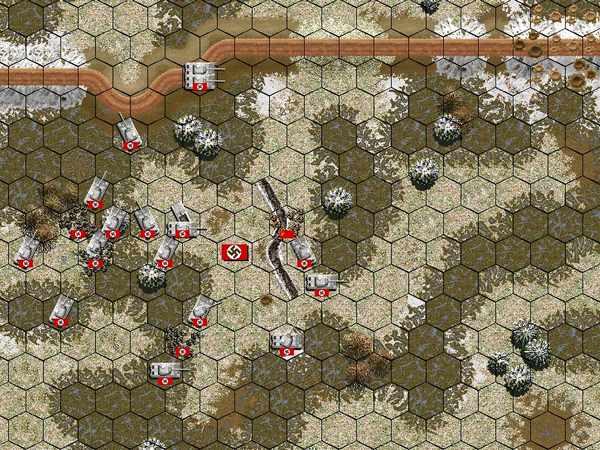
Shrapnel a mis en ligne une nouvelle mise à jour pour winSPWW2, l’adaptation du vénérable Steel Panthers. Au programme, 22 nouveaux scénarios ainsi que des améliorations pour une cinquantaine de missions et six campagnes, des icônes et graphismes supplémentaires ou encore l’mélioration d’une vingtaine de points de règles. Voyez le changelog pour une liste complète des changements. Le fichier se récupère depuis cette page du site officiel.
***
winSPWW2 v4.0 Upgrade Patch:
22 New scenarios
52 Revised scenarios
6 Revised campaigns including the ANZAC campaign
96 New or revised photos
29 New Icons
36 Updated OOB files
40 New or revised text files
4 Revised Sound files
17 Revised graphic files
Upgraded ScenHack, MOBHack, and Cost Calculator
1) There has been a new « explosives » class added to the game. In WW2 there are three types of units added to
each OOB
Booby traps
These represent any type of anti personnel weapon typically built from small explosive charges or bundles of hand
grenades. They may occasionally damage an armoured vehicle or destroy a truck.
Demolition Charges
A charge powerful enough to bring down a concrete / steel bridge but also used to bring down buildings on
advancing troops in defensive battles. They could also be used as « roadside bombs » or IED type weapons.
Fougasse
Fougasse was typically a mixture of gasoline and oil with an explosive igniter. In Britain during WWII fougasse was
usually a 40-gallon drum dug into the roadside and camouflaged at a location such as a corner where vehicles
would need to slow down. The Russians first used ‘Fougasse flame throwers’ in the defences around Moscow in
1941 and in the defence at Stalingrad. They were remote-controlled cans with nozzles designed to be embedded
in the ground and set off from a distance and they were the basis for a German copy that showed up in Italy.
Those weapons were buried with a fixed direction discharge tube and integrated with conventional landmines and
barbed wire in defence works. Weapons of this type were widely used in the Korean and Vietnam wars as well as
other conflicts and are well known to combat engineers.
NOTE: These units are set up as one per formation maximum to curb overuse. They cannot be moved so must be
placed during the deployment phase of the game.
2) Buildings that collapse into rubble for any reason will now cause casualties to anyone in the building with more
potential damage if the building is stone. Previous to this there was no test in the code for such casualties.
3) Engineer type vehicles that deliberately rubble a building will show markedly less chance sticking when
« bulldozing » buildings than regular tanks do.
4) Mobhack would now retain the nation when « Paste as target nation » box was selected when copying formations
from one nation to another.
5) When tanks turn their hulls to face an enemy firing they no longer turn the hulls directly 90 degrees which
generally increases their chance of survival by increasing the angle of attack for the shell.
6) Passengers who dismount into a hex with mines will now be tested to see if they set off a mine. Previously theonly test was for the vehicle when it entered the hex. This change also applies to any passengers unloading from ahelicopter or a helicopter landing in a minefield.
7) All OOBs have had every unit and formation trimmed back to 12/46 where the OOB still existed in 1946. All
OOBs have been checked for units that started before 1930 and the few that were found have been corrected to
1930. All OOBs that started or ended between 1930 and 1946 such as The Slovak Republic, Italian RSI, Polish
LWP and both Spanish OOBs have had their start and end dates adjusted to their actual in and out of service
dates used by the game code for all units and formations that strayed before or after those dates. Any unit with a
start date after 12/46 was removed. This was a holdover from the original version of the game that allowed game
play to 1949.There were 86 units that started after 1946 so were wasting space in the OOBs and there were 4851
units with end dates after 12/46 which made for « messy » OOBs.
8) There was an extensive comb though of the weapons list was done to corrected deviant and erroneous entries.
All weapons of one type should now have the same stats in every OOB they are listed
9) Japanese infantry units may now disperse but at a 50% chance compared to all other nationalities. This speeds
up the game and eliminates the need to hunt down 1 man squads.
10) MOBHack now shows template units used by formations as underlined in the units section and in the formation
section the total number of men in a formation is now reported up to a limit of 255.
11) After a campaign river crossing, your core infantry will no longer be permanently assigned an inflatable raft.
12) When playing PBEM in basic security mode the game will now simply warn players if the OOBs differ from the
original without aborting the game.
13) More historical battle locations for Canada in Normandy onwards in NW Europe have been added, such as « Le
Mesnil Patry », « Orne Valley », « Quesnay Wood », « Scheldt estuary », « Hochwald forest », Sonsbeck (town), and
Gronigen (city). In campaigns it is no longer possible to change a dead unit and retain that dead units experience
and morale for the new unit.
14) Smoke is now more readily available for non x0 armoured vehicles. In the past some formations contained
support units who’s purpose was to provide this service but they had no smoke rounds due to code restrictions.
These restrictions have now been removed.
15) The code has been adjusted so that the V hexes , both cluster and « shotgun », are more evenly distributed to
both sides.
16) Experience and Morale are now presented in the same order on all screens.
17) Occasionally the last reported page of formations in the purchase menu would turn up blank. This has been
corrected. The code was producing an extra page every 25 formations instead of at 26.
18) The ratings for HEAT protection of German Shurtzen has been increased from 6 to 10 based on new
information found in a post war British test.
19) Two of our game development programs have been included with this patch and can both be found in the main
winSPWW2 folder. ArmourCalc is a very straightforward program. Enter the armour thickness and angle and press
calculate and the answer is displayed in the Result box.The second program is named APCalc and is a bit more
involved. At the top of the screen is a « Select OOB » box where each nation can be picked. APCalc reads the
weapons data in each OOB and displays the potential armour penetration at various range increments for AP and
Sabot. HE and HEAT have only one result as they are not affected by range. There is also a « Best » results box for
each type which will give you the best possible result from 1000 calculations .Re-sampling CAN give a different
result sometimes, depending on the influence of the random factors the game uses to calculate penetration.
20) There were numerous minor unit and formation changes made to the OOBs .

